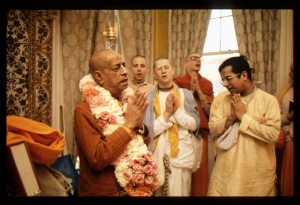CC Adi 13.115: Difference between revisions
m (1 revision(s)) |
(Vanibot #0054 edit - transform synonyms into clickable links, which search similar occurrences) |
||
| (One intermediate revision by one other user not shown) | |||
| Line 1: | Line 1: | ||
{{ | [[Category:Sri Caitanya-caritamrta - Adi-lila Chapter 13|C115]] | ||
<div style="float:left">'''[[Sri Caitanya-caritamrta|Śrī Caitanya-caritāmṛta]] - [[CC Adi|Ādi-līlā]] - [[CC Adi 13|Chapter 13: The Advent of Lord Śrī Caitanya Mahāprabhu]]'''</div> | |||
<div style="float:right">[[File:Go-previous.png|link=CC Adi 13.114|Ādi-līlā 13.114]] '''[[CC Adi 13.114|Ādi-līlā 13.114]] - [[CC Adi 13.116|Ādi-līlā 13.116]]''' [[File:Go-next.png|link=CC Adi 13.116|Ādi-līlā 13.116]]</div> | |||
{{CompareVersions|CC|Adi 13.115|CC 1975|CC 1996}} | |||
{{RandomImage}} | |||
==== TEXT 115 ==== | ==== TEXT 115 ==== | ||
<div | <div class="verse"> | ||
bhakṣya, bhojya, upahāra, saṅge la-ila bahu bhāra, | :bhakṣya, bhojya, upahāra, saṅge la-ila bahu bhāra, | ||
śacī-gṛhe haila upanīta | :śacī-gṛhe haila upanīta | ||
dekhiyā bālaka-ṭhāma, sākṣāt gokula-kāna, | :dekhiyā bālaka-ṭhāma, sākṣāt gokula-kāna, | ||
varṇa-mātra dekhi viparīta | :varṇa-mātra dekhi viparīta | ||
</div> | </div> | ||
| Line 14: | Line 18: | ||
==== SYNONYMS ==== | ==== SYNONYMS ==== | ||
<div | <div class="synonyms"> | ||
''[//vanipedia.org/wiki/Special:VaniSearch?s=bhakṣya&tab=syno_o&ds=1 bhakṣya]'' — foods; ''[//vanipedia.org/wiki/Special:VaniSearch?s=bhojya&tab=syno_o&ds=1 bhojya]'' — fried foods; ''[//vanipedia.org/wiki/Special:VaniSearch?s=upahāra&tab=syno_o&ds=1 upahāra]'' — presentation; ''[//vanipedia.org/wiki/Special:VaniSearch?s=saṅge&tab=syno_o&ds=1 saṅge]'' — along with her; ''[//vanipedia.org/wiki/Special:VaniSearch?s=la&tab=syno_o&ds=1 la]-[//vanipedia.org/wiki/Special:VaniSearch?s=ila&tab=syno_o&ds=1 ila]'' — took; ''[//vanipedia.org/wiki/Special:VaniSearch?s=bahu&tab=syno_o&ds=1 bahu] [//vanipedia.org/wiki/Special:VaniSearch?s=bhāra&tab=syno_o&ds=1 bhāra]'' — many packages; ''[//vanipedia.org/wiki/Special:VaniSearch?s=śacī&tab=syno_o&ds=1 śacī]-[//vanipedia.org/wiki/Special:VaniSearch?s=gṛhe&tab=syno_o&ds=1 gṛhe]'' — in the house of mother Śacī; ''[//vanipedia.org/wiki/Special:VaniSearch?s=haila&tab=syno_o&ds=1 haila]'' — was; ''[//vanipedia.org/wiki/Special:VaniSearch?s=upanīta&tab=syno_o&ds=1 upanīta]'' — carried; ''[//vanipedia.org/wiki/Special:VaniSearch?s=dekhiyā&tab=syno_o&ds=1 dekhiyā]'' — seeing; ''[//vanipedia.org/wiki/Special:VaniSearch?s=bālaka&tab=syno_o&ds=1 bālaka]-[//vanipedia.org/wiki/Special:VaniSearch?s=ṭhāma&tab=syno_o&ds=1 ṭhāma]'' — the feature of the child; ''[//vanipedia.org/wiki/Special:VaniSearch?s=sākṣāt&tab=syno_o&ds=1 sākṣāt]'' — directly; ''[//vanipedia.org/wiki/Special:VaniSearch?s=gokula&tab=syno_o&ds=1 gokula]-[//vanipedia.org/wiki/Special:VaniSearch?s=kāna&tab=syno_o&ds=1 kāna]'' — Lord Kṛṣṇa of Gokula; ''[//vanipedia.org/wiki/Special:VaniSearch?s=varṇa&tab=syno_o&ds=1 varṇa]-[//vanipedia.org/wiki/Special:VaniSearch?s=mātra&tab=syno_o&ds=1 mātra]'' — only the color; ''[//vanipedia.org/wiki/Special:VaniSearch?s=dekhi&tab=syno_o&ds=1 dekhi]'' — seeing; ''[//vanipedia.org/wiki/Special:VaniSearch?s=viparīta&tab=syno_o&ds=1 viparīta]'' — opposite. | |||
</div> | </div> | ||
| Line 21: | Line 25: | ||
==== TRANSLATION ==== | ==== TRANSLATION ==== | ||
<div | <div class="translation"> | ||
When Sītā Ṭhākurāṇī came to the house of Śacīdevī, bringing with her many kinds of eatables, dresses and other gifts, she was astonished to see the newborn child, for she appreciated that except for a difference in color, the child was directly Kṛṣṇa of Gokula Himself. | When Sītā Ṭhākurāṇī came to the house of Śacīdevī, bringing with her many kinds of eatables, dresses and other gifts, she was astonished to see the newborn child, for she appreciated that except for a difference in color, the child was directly Kṛṣṇa of Gokula Himself. | ||
</div> | </div> | ||
| Line 28: | Line 32: | ||
==== PURPORT ==== | ==== PURPORT ==== | ||
<div | <div class="purport"> | ||
A peṭāri is a kind of big basket that is carried in pairs on the ends of a rod balanced over the shoulders. The man who carries such a load is called a bhārī. This system of carrying luggage and packages is still current in India and other oriental countries, and we have seen that the same system is still current even in Jakarta, Indonesia. | A ''peṭāri'' is a kind of big basket that is carried in pairs on the ends of a rod balanced over the shoulders. The man who carries such a load is called a ''bhārī''. This system of carrying luggage and packages is still current in India and other oriental countries, and we have seen that the same system is still current even in Jakarta, Indonesia. | ||
</div> | </div> | ||
__NOTOC__ | |||
<div style="float:right; clear:both;">[[File:Go-previous.png|link=CC Adi 13.114|Ādi-līlā 13.114]] '''[[CC Adi 13.114|Ādi-līlā 13.114]] - [[CC Adi 13.116|Ādi-līlā 13.116]]''' [[File:Go-next.png|link=CC Adi 13.116|Ādi-līlā 13.116]]</div> | |||
__NOTOC__ | |||
__NOEDITSECTION__ | |||
Latest revision as of 18:23, 19 February 2024

A.C. Bhaktivedanta Swami Prabhupada
TEXT 115
- bhakṣya, bhojya, upahāra, saṅge la-ila bahu bhāra,
- śacī-gṛhe haila upanīta
- dekhiyā bālaka-ṭhāma, sākṣāt gokula-kāna,
- varṇa-mātra dekhi viparīta
SYNONYMS
bhakṣya — foods; bhojya — fried foods; upahāra — presentation; saṅge — along with her; la-ila — took; bahu bhāra — many packages; śacī-gṛhe — in the house of mother Śacī; haila — was; upanīta — carried; dekhiyā — seeing; bālaka-ṭhāma — the feature of the child; sākṣāt — directly; gokula-kāna — Lord Kṛṣṇa of Gokula; varṇa-mātra — only the color; dekhi — seeing; viparīta — opposite.
TRANSLATION
When Sītā Ṭhākurāṇī came to the house of Śacīdevī, bringing with her many kinds of eatables, dresses and other gifts, she was astonished to see the newborn child, for she appreciated that except for a difference in color, the child was directly Kṛṣṇa of Gokula Himself.
PURPORT
A peṭāri is a kind of big basket that is carried in pairs on the ends of a rod balanced over the shoulders. The man who carries such a load is called a bhārī. This system of carrying luggage and packages is still current in India and other oriental countries, and we have seen that the same system is still current even in Jakarta, Indonesia.